2012 Aprilia Tuono V4 R Review - Motorcycle.com
Longtime MO readers are aware of our affection for naked sportbikes. Sportier than most motorcycles but not nearly as committed as a race replica, nakeds present a balance of sport, comfort and versatility that provides a platform for any riding on paved roads. Most interesting are the liter-size streetfighters such as Ducati’s long-serving Monsters, Triumph’s iconic Speed Triple and Kawasaki’s recent Z1000. Any one of them has a grunty, wheelie-launching powerband, but all have less than 130 rear-wheel horsepower.
One of our favorite sporting nakeds has been Aprilia’s Tuono that debuted a decade ago, a nicely balanced conversion from the V-Twin RSV1000 racing platform that gave it upright ergonomics and similar engine performance, but it topped out at less than 115 hp. Now comes an all-new Tuono (“thunder” in Italian) that will blow away the powerplant in any previous naked sportbike.
Here’s proof: Our Tuono V4 R test bike cranked out 154 horsepower at its wheel, 20 horses up on even the wild Ducati Streetfighter. While altered valve timing, longer intake ducts and extra flywheel mass hint at some measure of the dreaded detuning common in streetfighter-type bikes, the Tuono’s 65-degree V-Four feels anything but. It’s simply one of the most thrilling engines we’ve ever had the pleasure of twisting its throttle.
The Tuono’s transmission’s gearing has been lowered in the first three gears, combining with a light-effort hydraulic clutch to yield low-speed acceleration unmatched by any supersport with its requisite racetrack gearing. In fact, the more rational transmission gearing is one of the treats of riding sporty nakeds – do we really need to be able to scream to 90 mph in first gear to have a capable sportbike?
The Tuono’s shorter gearing mixes perfectly with the tweaked RSV4 mill to deliver a run through a wide powerband as satisfying as anything on the road. There’s a musical surge of power that hurls the Tuono forward with a wild, grin-inducing rush. Wheelies are a joyful and inevitable result, as the Tuono’s funky front end will paw skyward even in third gear.
Although the 999cc Four can’t quite match the low-end grunt of some of its rivals, a much longer rev range (to its 12,400-rpm limit) results in a broad powerband. It really picks up the pace after 9000 rpm when it crosses the 125-hp hurdle and screams out for another 3400 revs, peaking with a galloping 153.9 hp produced at 11,600 rpm. Aprilia claims 167 hp at the crank for the Tuono and 180 hp for the RSV4, so it was surprising to see the Tuono’s power at the rear wheel nearly match the 155 hp of our last RSV4 R test bike.
While powerful motors in bikes without fairings aren’t unprecedented, the Tuono V4 is a dancer in the canyons that a VMax or B-King can’t come close to matching. The Tuono is underpinned by an aluminum chassis nearly identical to the RSV4 that won the 2010 World Superbike Championship in the hands of Max Biaggi. Also familiar is the three-way adjustable Sachs suspension that bolts in unchanged from the RSV4 R; wheels, too, are identical.
Adding taller handlebars and comfier ergos to this superbike platform results in one of the most thrilling street rides ever. Its bars give even a feeble rider tons of leverage to bend it swiftly into a corner, and a 0.5-degree increase in rake, 2mm added trail and a slightly longer wheelbase – plus a standard steering damper – give it the composure to scythe through any turn with confidence.
Our test bike was delivered with a rear tire squared off from many freeway miles and several dyno runs, and this caused it to require a minor but constant pressure on the inside bar to continue arcing consistently through corners. Our faith in the Tuono’s chassis was vindicated after a new tire was fitted and it steered like a good sportbike should. When in their proper shape, the Pirelli Rosso Corsas are excellent.
So the new Tuono goes like hell and rails around corners. What else do you need to know?
Alphabet Soup
Aprilia Traction Control consists of eight levels of intervention or can be completely disabled. Switchgear on the left handlebar allows adjustment on the fly. We preferred the TC3 setting, which provided a secure safety net while intervening only when ridden aggressively.
“Its traction control is one of the most seamless systems I’ve experienced,” Siahaan raves. “The fact it can be changed on the fly with the + and - paddles is an added bonus. And there’s a discernible difference in levels as well.”
Aprilia Wheelie Control can be set to three levels, and it does a great job of bringing the front wheel down in a gentle way. This being a raucous streetfighter, our favorite setting was “off.” Also aiding acceleration is the Aprilia Quick Shifter which allows full-throttle upshifts by briefly interrupting spark to the engine. It works fairly well at street speeds, but it works best when hard on the gas.
“AQS is such a benefit to quick riding that you don’t realize is so great until you don’t have it anymore,” says Trizzle. “Although I did notice it wasn’t happy shifting at low rpm.”
A Tuono rider can choose from three engine-control maps: Track, Sport and Road modes. Track mode, naturally, has the most aggressive throttle response, but it’s still quite manageable. Sport slightly restrains torque output but retains max horsepower. The Road setting reduces power 25% across the rev range.
The Tuono’s Brembo brake system is reliably capable of even racetrack abuse, although the fronts are the same as fitted to the old Tuono. As such, they consist of lower-spec two-piece calipers actuated by a non-radial master cylinder. Regardless, feedback through steel-braided lines is quite good.
“Braking power is strong and linear, with good feel at the lever,” Trizzle adds. “To me, it just goes to show that the difference between two-piece and monobloc calipers most likely will go unnoticed to the average Joe. It did for me.”
Like a good naked, the Tuono V4 performs well in general-purpose motorcycling. The Tuono has perfect ergos for this style of bike. Its moderately forward lean makes 80-mph cruising comfortable with little human-sail effect, yet it’s quite comfortable when cruising around town. And it has a reasonably good view from its mirrors for an Italian sportbike.
One nit we need to pick is its fluffy fueling below 3000 rpm, especially when cold, likely from a lean mixture to pass emissions standards. We hear throttle response can be significantly improved by fitting an Akropovic slip-on muffler ($1,545) from Aprilia’s accessory catalog, which includes access to the ECU’s “off-road-only” race map.
Speaking of emissions, the volume out the stock exhaust is pleasingly loud and sounds angry. It gives its rider a thrill just by blipping the throttle to hear its nasty bark, and it feels animalistic as it spits out the revs. The V-4 sounds, and is, sensational. Bonus: The Tuono’s exhaust system is 4.4 pounds lighter than the RSV4’s.
Aprilia claims a 4.5-gallon fuel capacity, but we wonder if it actually holds that much. “I had an indicated 17 miles on the low-fuel light and only managed to put 3.5 gallons into the Tuono’s fuel tank,” Content Editor Tom “T-Rod” Roderick notes.
Style Points
An important aspect of buying an Italian sportbike has always been its style and design. To our eyes, the Tuono can’t be regarded as pretty, but we find appeal in its sheer outlandishness. It plays Lamborghini to the Ferrari-ness of Ducati or MV Agusta. To Roderick, our Sunset Yellow bike looks like Bumblebee, the Chevrolet Camaro in the Transformer movies.
T-Rod also weighed in on the Tuono’s yellow-and-black seat, which he says is wrong for a few reasons. “First off, while the yellow seatlooks cool in brochure pictures, in reality the color soils easily and appears horrendous after a short period of ownership. Secondly, the seat is slippery when wearing leathers, and with the huge gap between tank and butt stop you’re sliding all over the place, especially under full acceleration. Lastly, the edges of the seat and fuel tank are sharp and dig into your thighs when leaning off the bike.”
If you’re okay with a more sinister color scheme, the Tuono’s Competition (matte) Black version is fitted with a slightly different seat and material.
Conclusion
“The Tuono V4 R is the perfect recipe for someone looking for a comfortable all-day motorcycle without giving up any of the performance qualities of a literbike,” Trizzle summarizes. “To be able to say the Tuono is not a RSV4 detuned for the street but rather a more comfortable RSV4 should be music to anyone’s ears.”
Simply put, the Tuono V4 R is now one of our favorite sportbikes. Stay tuned to see how it fairs against its Euro rivals in our upcoming shootout!
Related Reading
2012 MV Agusta Brutale R 1090 Review
2012 Yamaha YZF-R1 vs. 2011 Aprilia RSV4 R APRC [Video]
2010 Ducati Streetfighter Review
2009 Streetfighters Shootout: Aprilia Tuono 1000 R, Buell 1125CR, Triumph Speed Triple
More by Kevin Duke



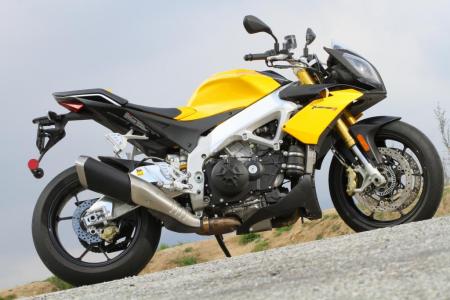











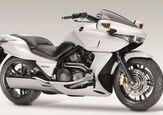
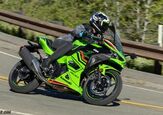
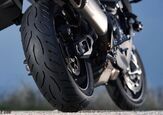


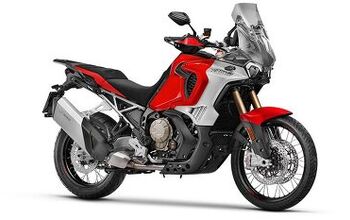
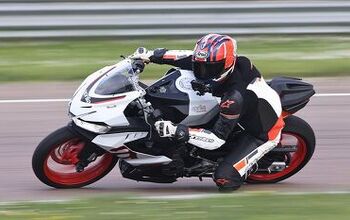
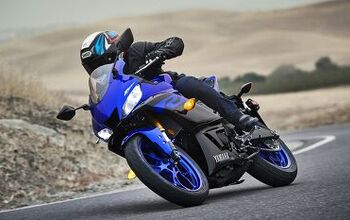
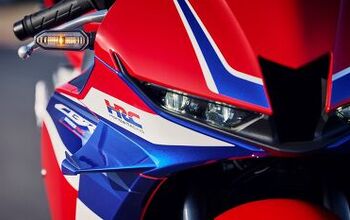
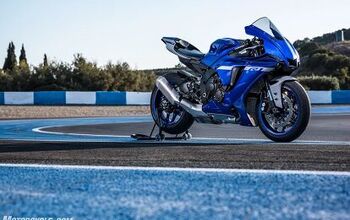
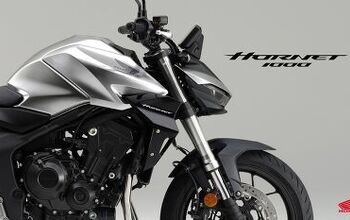
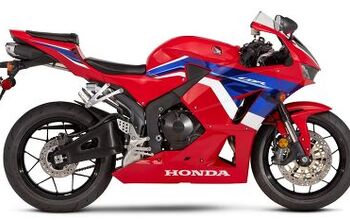
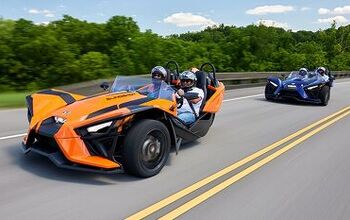
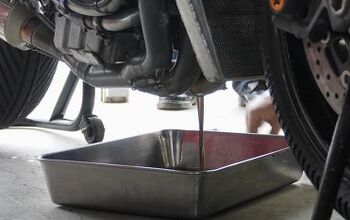



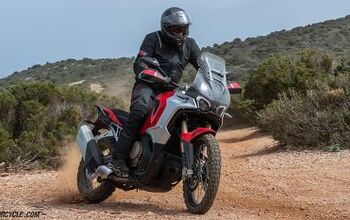
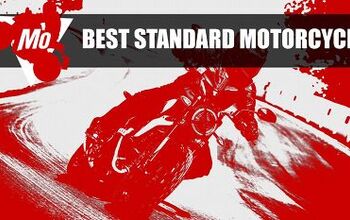
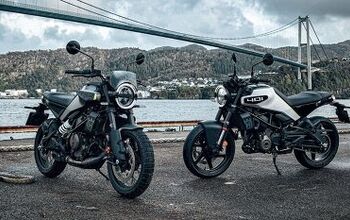
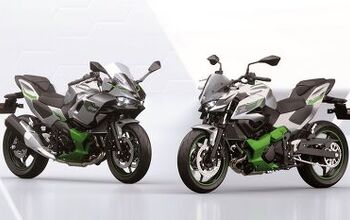
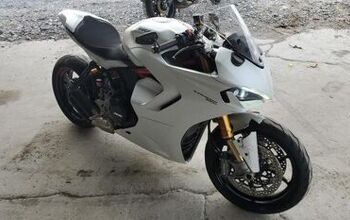
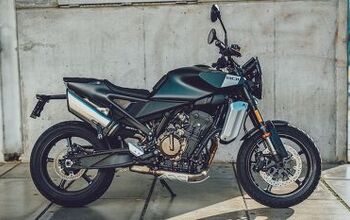
Comments
Join the conversation